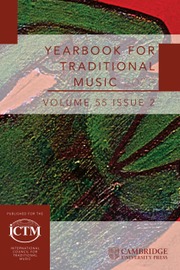I am delighted to welcome you to the first issue of the Yearbook for Traditional Music in 2023. The current issue is made up of three general submission articles that examine minority or marginal traditions within national contexts. Andrew Snyder begins with his study of Luso-Brazilian relations in Portugal shortly before the hotly contested Brazilian presidential elections of 2022. He finds himself performing at the prime minister of Portugal’s residence in Lisbon, where a bicentennial celebration of Brazilian independence appears to criticize the current leadership of right-wing Bolsonaro and celebrate or aspire for an alternative future under leftist Lula. The second article, written by Clare Chan, examines the songs of the Mah Meri community in Malaysia. Chan returns to a village where she has carried out fieldwork over the past two decades to reassess old questions about community solidarity from a new perspective informed by an enhanced understanding of ecological and educational song lyrics and themes. In the third article, Felix Morgenstern writes about the growth of nondiasporic Irish folk-music scenes outside of Ireland. His fieldwork at sessions and interviews with musicians in Graz, Austria, lead him to the conclusion that an “affinity of Austrian performers and audiences with Irish folk music might provide an alternative sphere of cultural identification to indigenous Austrian folk-music practices.”
As usual, these essays are followed by reviews of recent books, films/videos, audio recordings, and multimedia outputs. Nancy Guy reviews an ecologically informed edited volume, Performing Environmentalisms: Expressive Culture and Ecological Change. In our “Film/Video” section, Frank Gunderson draws our attention to a documentary on San dance culture in southern Africa, Wang Yang considers one of Leonardo D’Amico’s films on Bulang music in Yunnan Province, China (written in English and Chinese), and Zhiyi Qiaoqiao Cheng reviews a film on Korean folk songs in Japan, codirected by the late Yoshitaka Terada of the National Museum of Ethnography in Osaka, Japan. We have a review essay by Corey Harris in our “Audio Review” section. Harris picks out several highlights from Samy Ben Redjeb’s Frankfurt-based label, Analog Africa. Samantha Cooper’s multimedia review of Vanessa Paloma Elbaz’s “Ya Lalla” considers two interconnected multimedia projects which examine musical fertility rituals traditionally performed by North African Jewish women. Finally, Basile Koechlin reviews the first issue of the Journal of Audiovisual Ethnomusicology, which he suggests will appeal to scholars and filmmakers interested in the entanglements between music scholarship and audiovisual content.
Toward the conclusion of my term as Multimedia Review Editor with this Journal last year, I was honored to receive an invitation from the outgoing General Editor and incoming General Secretary, Tong Soon Lee, to become the next General Editor. I’d like to express my gratitude to the outgoing board members for holding the reigns over the past few years. Besides curating a fabulous array of research articles and reviews, they have overseen our move to publishing with Cambridge University Press (from 2019), facilitated our transition to two issues per year (from 2022), and assisted with handovers to our new editors. Thank you to Giorgio Biancorosso, Tasaw Lu Hsin-chun, Anna Yates-Lu, Luo Ai Mei, and Tong Soon Lee!
The incoming editorial board is made up of equally talented and hardworking colleagues with expertise in music and dance traditions from around the world. As with the previous board members, my new esteemed colleagues are active members of the editorial team. They include Yuiko Asaba (Editorial Assistant), Cassandre Balosso-Bardin (Multimedia Review Editor), Damascus Kafumbe (Book Review Editor), Noel Lobley (Audio Review Editor), and Michael B. MacDonald (Film/Video Review Editor). If you have any items for review or you would like to discuss matters related to the Journal, please don’t hesitate to get in touch. You can find our contact details on the International Council for Traditions of Music and Dance (ICTMD) and Cambridge University Press websites. We are willing to review items in any language, and we are particularly interested in reviews that draw attention to important scholarship in languages other than English.
In addition to welcoming our new editorial team, the staff at Cambridge University Press deserve much praise for their unwavering patience and expert assistance throughout the production process for this issue. I would like to thank in particular Emily Radican-Bradford, Jonathan Geffner, Vicki Verona, and Gnanasegaran Varadappan. As ever, I am eternally grateful to Carlos Yoder and Tong Soon Lee, the engine room of our Council at the Secretariat, for their support with administrative matters.
Over the summer, our membership body voted overwhelmingly to change the name of the Council from the International Council for Traditional Music to the International Council for Traditions of Music and Dance. Unlike the change to ICTMD, we cannot change the Journal’s name immediately due to the complexities of the publishing process and our contractual agreement with Cambridge University Press. A consultation process with and poll of the members of ICTMD is currently under way. In anticipation of a change to the name of this Journal, we are appointing more dance scholars to the editorial board to acknowledge the equal footing between music and dance.
We have also just had back-to-back World Conferences in Lisbon, Portugal (2022) and Legon, Ghana (2023). The conference issue for Lisbon is currently in production and will be published as issue two of 2023. The call for articles for the Legon conference was recently published in the October Bulletin. That issue will be published toward the end of 2024. For now, I hope you are inspired by the essays we have prepared for you here, and I look forward to receiving your submissions and hearing your ideas for the bright future of this Journal.


